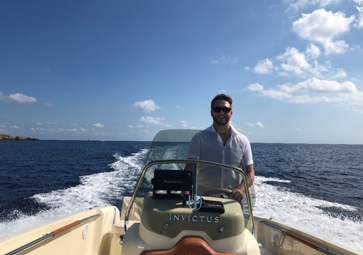Urban light pollution: Understanding impacts on aquatic environments.
Supervisors: Dr. Andrew Vowles, Prof. Paul Kemp
Research Group: International Centre for Ecohydraulics Research (ICER)

I studied BSc (Hons) Marine Biology at the University of Plymouth, followed by MSc Oceanography at the University of Southampton. Combining an emphasis on the biology of aquatic organisms with an understanding of their abiotic environments led to a particular interest in how changing environments affect organism behaviours, specifically the effect of artificial light at night; one of the most widespread and rapidly increasing alterations to the natural environment. Motivated to continue researching light pollution, and with the intention of influencing policy and legislation in the future, I jumped at the opportunity to be involved with this PhD.
Project Funders: University Studentship and the Environment Agency
Project details:
Natural light variation is a vital component of biological life and has been driven by daily, lunar and seasonal cycles since before the first emergence of life on Earth. These variations in light are responsible for a plethora of biological phenomena, including reproductive timing and development, orientation, habitat selection, communication, predator avoidance and navigation.
The introduction of artificial light at night (ALAN) by humans has led to a worldwide disruption to these natural light regimes and continues to spread at an estimated rate of 6% per year. However, the effect of ALAN on aquatic environments is surprisingly understudied, despite the vast number of light-sensitive taxa that are found in coastal and riverine ecosystems. With approximately 80% of the world’s megacities and 40% of major cities located near the coast, the potential for widespread effects of ALAN on light-sensitive aquatic taxa is considerable.
Therefore, my project will assess the impact of ALAN on the fine-scale behaviour of fish species of interest. Based on my findings, I will investigate methods to mitigate observed impacts, such as altering the intensity and/or spectral composition of lighting. This research will have important implications for the design and management of lighting around rivers and coastlines in urban areas and will help society progress towards smarter and more sustainable cities.


